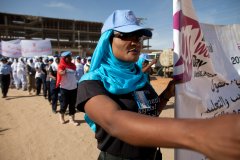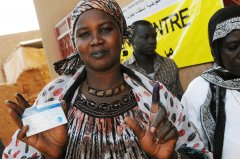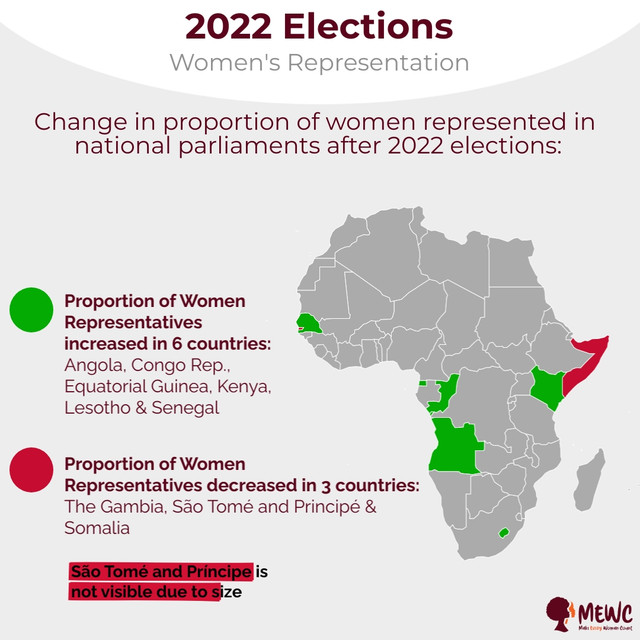Gender Issues Showlist
Women, Peace & Security
UNSCR 1325 calls on all parties to: protect and respect the rights of women and girls in conflict & post-conflict; increase women participation in all conflict resolution, peacekeeping and peace-building & to end impunity by prosecuting perpetrators of sexual and other violence on women and girls
index.php?option=com_content&view=category&id=56&Itemid=1913
Human Rights of Women
Thirty six years after the adoption of CEDAW, many women and girls still do not have equal opportunities to realize rights recognized by law. Women are denied the right to own property or inherit land. They face social exclusion, “honor killings”, FGM, trafficking, restricted mobility, early marriage,...
index.php?option=com_content&view=category&id=44&Itemid=1908
Violence Against Women
Violence against women is the most shameful human rights violation. Gender based violence not only violates human rights, but also hampers productivity, reduces human capital and undermines economic growth. It is estimated that up to 70 per cent of women experience violence in their lifetime
index.php?option=com_content&view=category&id=69&Itemid=1912
Political Participation & Leadership
Where women are fully represented, societies are more peaceful and stable. Women political participation is fundamental for gender equality and their representation in positions of leadership must be a priority for all Africans governments.
index.php?option=com_content&view=category&id=65&Itemid=1911
Latest News
- COTE D'IVOIRE: South-South Meeting to Promote Gender Equality and Combat Deforestation
- RWANDA: Rwanda Set to Launch Cervical Cancer Elimination Plan
- NIGERIA: Over 5,000 Nigerian Women Stranded in Iraq - Govt
- SUDAN: Healthcare Collapse Threatens Pregnant Women in Sudan's Sharg El Nil
- GHANA: President Nominates 12 More Ministers
- Senegal: Parliamentary election 2024
- Mauritius: Parliamentary election 2024
- Ghana: Presidential and Parliamentary Elections
- Botswana: Parliamentary elections 2024
- Algeria: Presidential Election 2024
EGYPT: Ramadan Ads Accused of Promoting Sexual Harassment, Domestic Violence
Source: Daily News Egypt
Several advertisements and programmes aired in Ramadan are believed to be "promoting sexual harassment and domestic violence", according to the Cairo Centre for Development (CCD), a non-government organisation (NGO) working in development and human rights.
Some of those ads and programmes are perceived to instigate violence against women and are accused of exploiting them for marketing purposes, according to a CCD statement on Saturday.
This is in addition to ads that would promote child abuse, in violation of child rights as stipulated in the Egyptian Child Law, and international agreements signed and ratified by Egypt. The Egyptian Child Law of 2008 prohibits children under the age of 18 from working in advertisements, considering it as act of exploitation.
"The entire media apparatus is flawed, in any place in the world, there are rules and regulations that govern the content of media shows," said Samy Abdel Aziz, former Dean of Cairo University's Faculty of Mass Communications and current Chairman of the Faculty's Media Studies Sector.
Abdel Aziz told Daily News Egypt that Egypt's flawed media apparatus creates an unfavourable climate for both the audience and the advertiser. The audience do not get to watch content on television, therefore resorting to the internet to view censored ads which leads to less viewership on television. The advertiser, meanwhile, loses because his ads are not shown and his products become stigmatised.
The statement mentioned a few examples of the ads and programmes that exhibit the abovementioned violations, the first of which was Egyptian actor Ramez Galal's prank show "Ramez Wakel El-Gaw".
Galal's annual prank shows receive controversial and mixed reactions from audiences. This year, Galal organises a prank on a celebrity, whereby he/she is invited on a jet for an aerial tour of Dubai with Galal and other passengers. Then a few minutes later, passengers are tricked into believing that the plane is crashing as the pilot begins to do stunts.
The CCD specifically criticises the episode featuring American actress and model Paris Hilton, and accused Galal of sexual harassment as he made repeated physical contact with Hilton while the plane was seemingly losing balance as part of the hoax.
Another advertisement for a resort, featuring Egyptian actor Amr Youssef, is accused of degrading women and promoting societal acceptance of sexual harassment. The ad shows the actor in different avenues of the resort, while making remarks about women he sees as he walks along.
An anti-harassment initiative called "I Saw Harassment" also condemned this ad, stating that Youssef "was visually and verbally harassing actresses in the advert".
The statement also mentions the recently banned ad belonging to Fox Chips Company, for promoting domestic violence and spreading a negative image of parenting. Abdel Aziz criticised the ad for containing violence and "distorting values", and commended the Consumer Protection Agency's (CPA) decision to ban the advertisement, calling it a "positive intervention".
CPA Head So'ad El-Deeb previously told Daily News Egypt that Fox Chips's ad "promotes violation of dignity and hatred", and that after receiving many negative comments about the ad, the decision was taken to ban it.
Abdel Aziz said the content of some ads does not fall in line with the media code of ethics, citing Etisalat's advertisement that ridicules Vodafone's advertisement as an example.
"This kind of competition is completely unacceptable on professional terms," says Abdel Aziz. He added that owners of satellite channels should be held responsible when it comes to the choice of advertisements aired.
Ramadan is well known for its enormous amounts of ads and programmes that compete for the maximum number of viewers each year. Channels compete to acquire the maximum number of advertisements during this month, with the expected volume of advertisements in channels reaching EGP 500m, accounting for roughly 30% of the year's advertisement volume.





